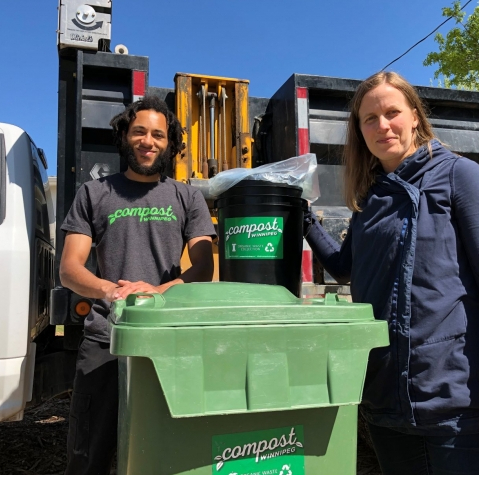Producer

Compost Winnipeg
Contact: Karrie Blackburn
, ,
Phone: 204-232-0025
Website: www.compostwinnipeg.ca
About Us
Compost Winnipeg is a social enterprise of Green Action Centre, a non-profit, non-governmental organization, based in Winnipeg and serving Manitoba. Operating since 1985, Green Action Centre promotes greener living through environmental education and encouraging practical green solutions for homeowners, workplaces, schools and communities.
We offer commercial composting services for restaurants, businesses and institutions. Increase the sustainability of your operation by integrating an organic waste diversion system. Reduce waste by about 40%! We'll help you figure out how to set a system up, train staff, provide signage, compost collection bins and weekly pick-ups.
We help figure out your needs, set you up with appropriate bins, and pick-up your organic waste once a week for composting. We track how much you're composting, give you regular organic waste diversion reports and promote the amazing work you are doing to lighten your load on the earth.
Composting is an easy way to invest in a sustainable future
We offer commercial composting services for restaurants, businesses and institutions. Increase the sustainability of your operation by integrating an organic waste diversion system. Reduce waste by about 40%! We'll help you figure out how to set a system up, train staff, provide signage, compost collection bins and weekly pick-ups.
We help figure out your needs, set you up with appropriate bins, and pick-up your organic waste once a week for composting. We track how much you're composting, give you regular organic waste diversion reports and promote the amazing work you are doing to lighten your load on the earth.
Composting is an easy way to invest in a sustainable future
Practices
While we dream of having a commercial composting site that is our very own, for now we have some excellent composting partners. The licensed compost sites used by Compost Winnipeg have to go through an environmental licensing process with Manitoba Conservation and Water Stewardship. They must develop their site carefully, balance the compost recipe and constantly monitor the process. Finished compost must meet environmental and compost quality standards. While the process for aerobic commercial composting is very similar to backyard composting, there are some key differences, especially scale. Large windrows and commercial in-vessel systems allow for microbes to generate enough heat to destroy pathogenic organisms and for composting to continue through the winter.
Currently, the majority of our compostable waste goes to Progressive Waste's Prairie Green Composting Facility in Stony Mountain. Here, large windrows are turned by a compost turner to aerate and mix the pile. We also work in partnership with Seven Oaks School Division to assist with their composting program while learning ourselves how to use an in-vessel composter. Compost produced at Seven Oaks is used on school grounds.
The usual composting process involves mixing food waste with leaves or wood chips, creating a balance of nitrogen and carbon. If the right amount of moisture and oxygen are added, it creates an ideal environment for beneficial micro-organisms, which break the waste down into smaller and smaller particles. Once this process is complete, we have finished compost. Good quality compost will look like soil, but it is so rich in nutrients that it acts more like fertilizer. Read on to learn more about how compost can reduce greenhouse gases and reverse the impacts of climate change.
When organic waste goes to a landfill, it is buried and suffocated. Without oxygen, the waste attracts anaerobic bacteria that release methane and other harmful gases as they digest all this food. When methane gas is released into the atmosphere, it is at least twenty times more harmful than carbon dioxide. When composting is done in an oxygenated environment, the only greenhouse gas released is carbon dioxide.
Once compost is returned to the land, it increases the soil’s capacity to capture and store even more carbon; this is called carbon sequestering. Compost is also a natural soil fertilizer, eliminating the need for synthetic fertilizers that release nitrous oxide into the atmosphere. Nitrous oxide is a greenhouse gas with roughly 300 times the warming potential of carbon dioxide.
Currently, the majority of our compostable waste goes to Progressive Waste's Prairie Green Composting Facility in Stony Mountain. Here, large windrows are turned by a compost turner to aerate and mix the pile. We also work in partnership with Seven Oaks School Division to assist with their composting program while learning ourselves how to use an in-vessel composter. Compost produced at Seven Oaks is used on school grounds.
The usual composting process involves mixing food waste with leaves or wood chips, creating a balance of nitrogen and carbon. If the right amount of moisture and oxygen are added, it creates an ideal environment for beneficial micro-organisms, which break the waste down into smaller and smaller particles. Once this process is complete, we have finished compost. Good quality compost will look like soil, but it is so rich in nutrients that it acts more like fertilizer. Read on to learn more about how compost can reduce greenhouse gases and reverse the impacts of climate change.
When organic waste goes to a landfill, it is buried and suffocated. Without oxygen, the waste attracts anaerobic bacteria that release methane and other harmful gases as they digest all this food. When methane gas is released into the atmosphere, it is at least twenty times more harmful than carbon dioxide. When composting is done in an oxygenated environment, the only greenhouse gas released is carbon dioxide.
Once compost is returned to the land, it increases the soil’s capacity to capture and store even more carbon; this is called carbon sequestering. Compost is also a natural soil fertilizer, eliminating the need for synthetic fertilizers that release nitrous oxide into the atmosphere. Nitrous oxide is a greenhouse gas with roughly 300 times the warming potential of carbon dioxide.
